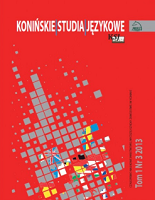Examining the efficacy of oral corrective feedback on Japanese language learners through action research: Cognitive effects of metalinguistic feedback
Examining the efficacy of oral corrective feedback on Japanese language learners through action research: Cognitive effects of metalinguistic feedback
Author(s): Kinji ItoSubject(s): Foreign languages learning, Applied Linguistics, Cognitive linguistics, Pedagogy
Published by: Akademia Nauk Stosowanych w Koninie
Keywords: action research; human cognitive process; Japanese; language pedagogy; oral corrective feedback;
Summary/Abstract: This classroom-based action research examines the effects of oral corrective feedback (OCF) on intermediate Japanese language learners in higher education. The main purpose of this research was to find how pedagogical practices of feedback support learners’ utilization and retention of previously learned knowledge most effectively. The study employed three different types of OCF in order of implicitness, that is, recast, elicitation, and metalinguistic feedback, in order to address the following research questions: (1) Of the three types of oral corrective feedback chosen for the study, that is, recast, elicitation, and metalinguistic feedback, which one works best for language learners in terms of repair rate?, and (2) What types of linguistic errors, that is, conjugation, particle, and vocabulary, are most likely to be targeted by oral corrective feedback? A total of 21 undergraduate students were observed during two semester-long courses. Audiotaped interactions between the participants and the instructor were analyzed for errors in utterances during one-on-one conversations in a well-controlled research environment. In the end, the study discovered that the third mode (metalinguistic feedback) was more effective than the others by a large margin, and lexical errors were corrected the most. The outcomes suggest that metalinguistic feedback involving human cognitive process is beneficial for language learning, particularly for vocabulary acquisition.
Journal: Konińskie Studia Językowe
- Issue Year: 9/2021
- Issue No: 4
- Page Range: 455-476
- Page Count: 22
- Language: English

